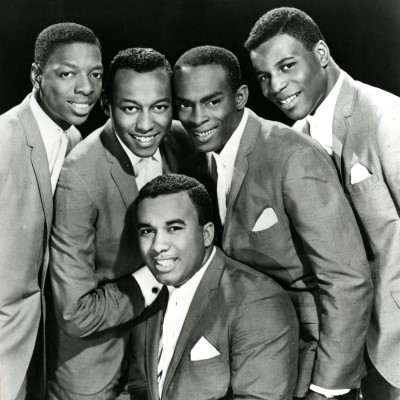Although rising to prominence in the 1970s for another label with a sound forged in another city, the Spinners spent a decade at Motown, where they not only had hits, but also performed a host of tasks in and out of the Hitsville studio, and for a time were so identified with their hometown that in Great Britain, they were known as the Detroit Spinners.
FAST FACTS:
- First Hit: “That’s What Girls Are Made For.”
- Biggest Hit: For Motown, “It’s A Shame”: for Atlantic Records, “Then Came You,” with Dionne Warwick.
- Biggest Album: For Motown Second Time Around; for Atlantic Records, Pick Of The Litter.
- Career Highlight: For Motown, their first Top 20 Pop hit, “It’s A Shame”; for Atlantic Records, reeling off an impressive string of 11 consecutive Top 10 R&B hits, causing music historian Leo Sachs to write “The Spinners were the heart and soul of Black music in America during the early ‘70s.”
Forming during the mid-1950s, when harmonizing vocal groups flourished on Metro Detroit’s street corners, the Domingos endure a few early personnel shifts before coming together as a quartet in Ferndale, just north of Eight Mile and a few miles from where, in a few years, Berry Gordy will build his Hitsville Studio. Teenagers Billy Henderson, C.P. Spencer, Henry Frambough and Pervis Jackson are its members when Bobbie Smith joins to form a quintet. Their name combines the handles of two influential aggregations, the Dominos and the Flamingos and they sing at storefront churches, in rugged local bars, and everywhere in between.
The Domingoes win their first talent show, and its $100 prize, at the Gold Coast Theater, besting formidable competition like the Falcons and the Matadors, who would soon be rechristened the Miracles. But seeking a new identity, they rechristen themselves as the Spinners, a name auto-enthusiast Bobbie Smith suggests since the big hubcaps on Cadillacs are called “spinners” and it connects them with their motor city hometown. Another change occurs when Spencer leaves the group, replaced by George Dixon.
The Spinners meet Harvey Fuqua, former leader of the Moonglows who has moved to Detroit to operate Anna Records, a small record label owned by Berry Gordy’s sister Gwen (and named for another Gordy sister, Anna). Harvey begins to mentor the group and, when Anna Records goes under and he and Gwen start the Harvey and Tri-Phi labels, the Spinners are his first signing.
With Tri-Phi, the Spinners record the label’s first single, the doo-wop sound of “That’s What Girls Are Made For,” written by Harvey and Gwen and recorded at Berry’s Hitsville Studio A with Marvin Gaye, who had been a member of Fuqua’s final version of the Moonglows, on drums. Released in May 1961, they have a hit right out of the box, charting at Number 5 R&B and Number 27 Pop. The Spinners release four more singles and back up other Tri-Phi artists – including Fuqua – on their single releases over the next two years, but nothing else dents the charts.
In ’63, with debt piling up, Fuqua and Gwen transfer their company to Berry, who assumes the debt, hires Harvey to write, produce and work in Artist Development, and adds some Tri-Phi/Harvey artists – including the Spinners – to the Motown roster. But rather than getting busy recording, the group is asked to assume a wide range of tasks – chaperones, road managers, drivers and background singers – while they continue to polish their harmonies and stagecraft.
In October ’64, over a year after joining Gordy’s company, the Spinners release their first single on Motown, “Sweet Thing,” transitioning from doo-wop to a solid slice of the emerging Detroit Sound coming out of Hitsville, written and produced by Ivy Jo Hunter and Mickey Stevenson. With Motown starting to dominate the charts, thanks to smash hits by many of the top-tier acts, there’s little room for these newcomers on radio playlists and the song does not chart. But it portends good things to come and, years later, “Sweet Thing” becomes a favourite on U.K.’s Northern Soul scene.
After Chico Edwards, who had been a Domingo in the earliest days, replaces Dixon, the Spinners next single, another Hunter/Stevenson production, duplicates some of the pleasing chord changes from “Sweet Thing” and success follows. “I’ll Always Love You.” released in June ’65, leaps into the Top 40 Pop market and soars to Number 8 R&B. It allows Motown to put the Spinners on the road with bigger Motown stars like Marvin Gaye and the Motortown Revue as a warm-up act, playing venues around the U.S. They develop a well-received humourous routine in performance where they don long haired wigs and pick up fake guitars to sing a medley of cover songs as “The Brown Beatles.”
Like “Sweet Thing,” “I’ll Always Love You” is also released in the U.K., but because a folk group there is named “The Spinners,” the group’s name is changed on their second Tamla Motown to “The Detroit Spinners.” That remains their name on Tamla-Motown releases until 1970.
The Spinners’ recording schedule picks up steam and the success of “I’ll Always Love You” gets Motown planning an album, going so far as to assign a catalog number to a projected LP for release in late ’65 or early ‘66. Among the tracks they recorded in this period is “Truly Yours,” yet another excellent Hunter/Stevenson production, released as a single in March ’66. It peaks at Number 16 on the R&B chart but falls short of the Top 100 on the Pop side. The LP is postponed, however, and – with so many of Motown’s top-tier artists pumping out huge — the Spinners get overlooked and do not have another single release that year.
At a time when Tin Pan Alley songs and other MOR-radio format fare are being re-tooled for the youth market, Ivy Jo Hunter produces the Spinners version of “For All We Know.” Co-written in 1934 by J. Fred Coots, who also composed “Santa Claus Is Coming To Town.” The song has been recorded frequently over time and the Spinners’ version becomes their next release in May 1967, but it fails to find an audience.
Their long-delayed debut Motown LP, The Original Spinners, is released in August 1997. The Tamla-Motown version, with an identical track list, is entitled The Detroit Spinners. Shortly after the LP is released, Chico Edwards leaves the group, replaced by C.G. Cameron, who takes over the lead vocal duties from Bobbie Smith. Just back from Vietnam, where he had been wounded in combat, Cameron learns of Chico’s departure from an old friend, the Temptations Dennis Edwards.
Cameron’s disc debut comes on the Spinner’s next single release in September ‘68, “Bad, Bad Weather Till You Come Home.” It does not chart.
Transferred to the V.I.P. label, the Spinner’s next single – their lone release in ’69 – is a cover of the Moonglows 1955 hit “In My Diary,” an attempt to capitalize on the doo-wop revival in soul music, typified by hits from the Dells and the Originals. It’s also something of a tribute to their mentor, Harvey Fuqua, but it misses the charts.
The Spinners second V.I.P. single, released in February ’70, covers the Temptations Puzzle People album cut, “Message From A Black Man.” With multiple lead voices and a political lyric set against a psychedelic soul track, the Johnny Bristol production doesn’t stray far from Norman Whitfield’s original as Motown moves deeper into socially conscious material. This release also fails to chart.
The third time on V.I.P., however, is a charm as “It’s A Shame” – released in June ’70 – becomes the Spinners’ biggest Motown hit. C.G. Cameron and his harmonizing mates ride the slamming Stevie Wonder-produced track to Number 4 on the R&B chart and Number 14 on the Pop chart. Cameron and Wonder had become friends and Stevie tailored the song specifically for C.G., who nails his lead vocal in one take. Stevie contributed keyboards and some of the drumming on the track, which also features memorable work from Funk Brother guitarists Dennis Coffey and Robert White. Cameron would later say the song gave the Spinners, “a broader vision of their capabilities.”
The B-side of “It’s A Shame” is “Together We Can Make Such Sweet Music,” covered the original 1968 version by Detroit singer Joe Towns on a small local label Top Dog, which Motown eventually absorbs. The Spinners version has Bobbie Smith taking most of the lead vocal and Cameron singing lead on the bridge. “Together” would resurface for the Spinners in different incarnations down the road
The Tamla Motown single release of “It’s A Shame/Together We Can Make Such Sweet Music” changes the name of the group once again, this time to “The Motown Spinners.”
The smash hit occasions the release of the Spinner’s next LP, 2nd Time Around, is released on V.I.P. in October 1970. In the UK, as with the hit single, the Tamla Motown LP is credited to The Motown Spinners.
The follow-up to “It’s A Shame” is also produced by Stevie Wonder, and co-written by him and his new wife, Syreeta Wright. But, while a solid entry, “We’ll Have It Made” lacks the immediacy and punch of its predecessor. Released in December 1970, it nevertheless rises to Number 20 R&B and makes the the Pop chart at Number 89.
In ’71, Tamla Motown gives “Together We Can Make Such Sweet Music” a shot as an A-side in the UK, backed by “Truly Yours,” which had not previously been released there.
With their Motown contract expiring in 1972 and the group not content with their inconsistent recording history, the Spinners look to sign elsewhere. Stax and Avco Embassy make offers but fellow Detroiter Aretha Franklin suggests her label, Atlantic Records, and they take her advice and depart Motown. However, Cameron – whose own contract has a different expiration than the other members and who has married into the Gordy family through Gwen Gordy, whose marriage with Harvey Fuqua had ended – remains at Motown and leaves the group. But Cameron suggests they audition an old friend of his, Phillip Walker, for his spot. Walker, who has changed his name to Philippe Wynne, impresses not just the Spinners but also Temptations singer Eddie Kendricks, whose endorsement of Wynne seals the deal.
Bobbie Smith later tells music historian Keith Hughes, “You know, at Motown, we never got angry or mad at anybody – we just figured our time was going to come later. People would come in and go past us, but we were happy thee because it was like a family. I always tell people that being with Motown was like going to college and coming out as an A student. I learned a lot there.”
Recording in Philadelphia with producer/songwriter Thom Bell, the Spinners become big hitmakers and headliners at last for Atlantic with the smooth Smith and the impassioned Wynne sharing lead vocals and Bell giving them lush tracks to caress. Landmark songs like “I’ll Be Around,” “Could It Be I’m Falling In Love” “Then Came You” with Dionne Warwick, “Mighty Love,” “One Of A Kind (Love Affair),” “Games People Play” and “Ghetto Child.”
In April 1973, just after “Could It Be I’m Falling In Love” completed its chart run, Motown releases a remixed “Together We Can Make Such Sweet Music” to echo the Philadelphia sound that has made the Spinners a hot group, with a prominent string section and dubbing an instrumental break in the bridge over Cameron’s deleted part. The song peaks on the Pop chart at Number 91, their last Motown single to chart, displaying the high quality of the Spinners’ best Detroit recordings. In the U.K., their billing on the remixed single reverts to “The Detroit Spinners.”
Additionally, Motown releases an LP The Best Of The Spinners (entitled Best Of The Detroit Spinners in The UK) with the remixed “Together” as the lead track.
In 1995, the group’s 2nd Time Around album is released on CD for the first time by Polydor Japan.
In 2001, Universal’s Spectrum Music in the UK releases Detroit Spinners, Essential Collection on CD, collecting 18 tracks of their Motown and Tri-Phi material.
Kent Records in the UK releases The Spinners, Truly Yours on CD in 2012, combining the group’s first Motown LP, never previously on CD, with 14 bonus tracks recorded between 1963-1067, 10 of which were previously unreleased.
An expanded edition of The Spinners 2nd Time Around album is released with 13 bonus tracks for streaming services by Universal Music in July 2018.





